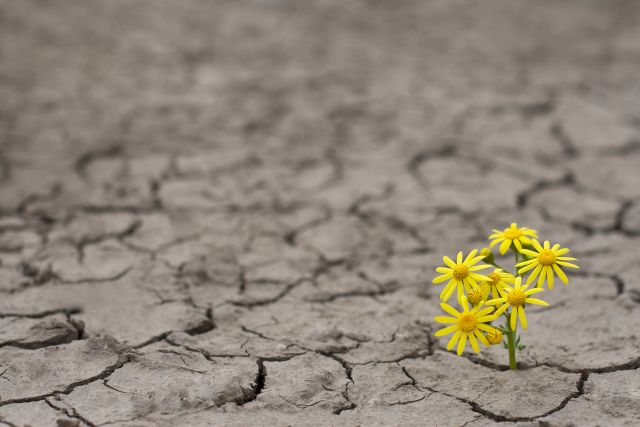On an everyday basis we use the word hope fairly casually. We say, “I hope that it’s sunny tomorrow” or “I hope you have a nice day.” But when we feel trapped in situations beyond our control, being able to hold on to hope feels anything but casual. During difficult times, hope feels both nourishing and necessary in order to be able to muster the strength and determination to keep going.
Hope is the clarion call of comfort and encouragement that we hear within our own hearts.
To keep hope alive we must be willing to turn our attention toward finding it, forging it and holding on to it. This is no small feat—in addition to our personal struggles, we must also contend with the unstable and disturbing climate in our world today that is rife with relentless economic, civil and political unrest.
My friend Janet is 92 years old. In spite of this contentious election cycle, she remains resolute in feeling hopeful. She explains it this way, “I decided after living through World War II that hope is stronger than fear. I can handle disappointment, but I don’t want to live in a world without hope. I feel that it’s my responsibility to be hopeful. That way I can keep moving forward, no matter how hard things get, instead of just getting stuck in feeling sorry for myself.”
Hope beckons us to trust that we can continue to live well in spite of this life’s burdens and unpredictable nature. Hope walks beside us when the future seems lonely, scary and unclear. It holds us and heartens us with every courageous and shaky step we are able to take along the way. It gently encourages us to consider that life can still be good even without the promise that it will turn out a certain way.
How Hope Motivates Us
Hope sometimes gets a bad rap. Often it is described as soppy, groundless enthusiasm generated by either naiveté, blissful ignorance or both. The naysayers intone, “It’s just not realistic.” But hope is more a verb than a noun. It’s actually a mechanism of action.
Clinical psychologist Charles R. Snyder, (1944-2006) published six books on the topic of hope, as well as 262 articles on how hope can positively impact multiple aspects of life, including health, work, education and personal meaning. Snyder characterized hopeful individuals as people who are able to set clear goals and are flexible in finding alternate ways to achieve those goals when obstacles arise. According to Snyder’s “Hope Theory” when a person has hope they exhibit agency (the will to get there) and a determination to seek and uncover pathways (different ways to get there).
Hope is not a quaint, myopic, philosophical construct. It’s a proactive vehicle of expanded vision and belief that allows us to see life exactly as it is while willfully steering it toward how it could be better.
Fostering Hope Through Dark Times
One would think that the ability to feel hopeful is a byproduct of easier times. This presumption is understandable because gentler times soothe us, encourage us and brighten our spirits. But, paradoxically, hope is just as often created and galvanized in the most difficult of circumstances.
Mahatma Gandhi kept hope alive as he led the nonviolent struggle for India’s independence against seemingly insurmountable odds. Viktor Frankl survived several Nazi concentration camps although his pregnant wife and all of his family members, except for one sister, died in the camps. In spite of these unspeakably tragic circumstances, after the war he spread his message of hope through his book, Man’s Search for Meaning. Since it was first published in 1946, over 12 million copies of the book have been sold with translations into 21 languages. To this day it is considered to be one of the 10 most influential books in America.
Fifteen year old Pakistani activist Malala Yousafzai was shot by the Taliban for standing up for a female’s right to education. Rosa Parks was jailed for sitting down at the front of the bus in protest of segregation. Somehow, through their hardships, they kept hope alive as they simultaneously sparked back-breaking, groundbreaking movements of change.
But the ability to muster hope through the darkest of times is not a unique and rare talent that should be ascribed only to our heroic role models. We, too, have this same intrepid capacity. It would only take a moment’s reflection to recall the times in our own lives when we did not think that we could go on, but we did. Against the odds we invited the voice of hope within to encourage us past the despair of “I can’t” to the audacity of “I will.”
Holding on to hope will require us to feel worthy of this right to say “yes” to growth through struggle, especially at times when our fear is understandably shaking its head “no.”
Key Beliefs of Hopeful People
In his book, Making Hope Happen, Gallup Senior Scientist Shane J. Lopez devotes the first chapter to his client, John, who came to him when he found out that he was suffering from end-stage kidney disease. He called the chapter, What the Man with No Future Taught Me about Hope. Lopez recounts how John struggled with his dire prognosis to the point of considering suicide. But as he continued to focus on what gave his life meaning, John came to a different decision. He told Lopez that henceforth if anyone asked him how he was doing he would simple and resolutely reply, “I’m working on it!” This was his way of proactively pushing despair aside as he generated the hope he needed to keep moving forward one deliberate and life-preserving step at a time.
As a result of his research with millions of people around the world Lopez identified what he refers to as the “Hows of Hope.” He shares 4 key beliefs of hopeful people:
- The future will be better than the present
- I have the power to make it so (Important: Hopeful people never go it alone)
- There are many paths to my goals
- None of them will be free of obstacles
He wrote, “Although some people still believe that hope is too “soft” to study scientifically, other researchers and I have convincing evidence that hopeful thoughts and behavior propel everyone toward well-being; that hope underlies purpose-driven action; that it correlates positively with health and even longevity; and that it doesn’t depend on income level or IQ. Hope can be learned, and the hopeful among us play a powerful role in spreading hope to others.”
Befriending Hope
Although we can’t see it or touch it or quantify it, hope is the anchor we want and need when life’s challenges rock our world. How fortunate it is for us that hope is not dependent on any external condition to exist. It does not require us to have any special skills. No one has a monopoly on hope. It can’t be bought or sold. It is an equal opportunity lender.
Hope is a congenial, compassionate and attentive friend. We could say that it’s optimistic and that would be true. But hope offers more than a wish for future comfort. It tells us the truth while holding us in its warm embrace. Hope says “This terribly difficult thing is happening and we will find a way to handle it together.” Hope reminds us of our strength as it encourages us to keep moving onward, saying “I know you have every reason to feel like giving up or turning away from this challenge. But in spite of your fears, I know you can face this. I believe in you.”
Hope is unconditional. It doesn’t say you’ll be okay if your relationship works or if your health recovers or if you find another job. Hope steadfastly and without any preconceived stipulations repeats again and again, “Your life is precious and vital, now and for always, no matter the circumstance.” We will continue to uncover the good together as we go forward.”
If you enjoyed this article, you may also enjoy Four Ways to Respond to Fear and Enhance Your Health.
This article was originally published in Ornish Living.






